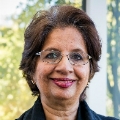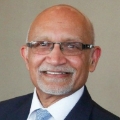USA, China and the Future of Global Trade
VIEW EVENT DETAILSFuture of Asia Series: Part II

Nirupama Rao, Arun Kumar, Taimur Baig, Arijit Ghosh
As China aims to become an ‘advanced manufacturing powerhouse’ by 2025, the United States’ rising economic pressure over China through financial sanctions impends the possibility. The trade sanctions have been escalating, with indistinct possibilities of an agreement or truce.
Global trade is no longer a simple process of manufacturing in one country and sale in another. A smartphone or television designed in the U.S, has semiconductors and processors manufactured in Taipei or South Korea, gets assembled in China, marketed in U.S and Europe and finally receives after-sales service in the developed part of the world. So, when U.S and China decide to enter into a trade war, it has repercussions on the global value chains. Also, both these nations are top trading partners with most economies in the world, both developed and developing.
Vietnam has emerged as the biggest gainer as Vietnamese exports to the US took a 20% year-on-year jump from July 2018 until April 2019, when the US imposed the first round of tariffs on China. Though not a significant presence in the global value chains, India is being considered as a potential manufacturing alternative by multinationals. But China’s growth has been a result of bold policies, investor-friendly avenues and enormous investments in infrastructure. Do countries like India and Vietnam have the requisite infrastructure to absorb manufacturing jobs? With a currency and technology war looming, the global economy is likely to get affected. What common grounds can bring the conflict to a possible end?
Join us as we discuss the possible consequences and opportunities arising from a global trade war, and how they will shape the future of the global economy with Ambassador Nirupama Rao, former Foreign Secretary of India and former Ambassador to USA and China; Mr Arun Kumar, Chairman and CEO, KPMG India; Dr Taimur Baig, Managing Director and Chief Economist, DBS Bank and Mr Arijit Ghosh, South Asia Managing Editor, Bloomberg as moderator.

A career diplomat by profession, Nirupama Rao retired as Foreign Secretary to the Government of India in 2011. She was the first woman spokesperson (2001-02) of the Indian foreign office. She served as India's first woman ambassador to Sri Lanka (2004-2006) and to the People's Republic of China (2006-2009). She was Ambassador of India to the United States from 2011 to 2013. In retirement, she has taught at Brown and Columbia Universities. She is currently working on a book on the relationship between India and China. She was a Jawaharlal Nehru Fellow from 2015-2016. Ambassador Rao was a Visiting Scholar at the India China Institute at The New School in New York in 2016 and was also appointed a Public Policy Fellow at The Wilson Center in Washington D.C in 2017.

Arun M. Kumar is the Chairman and CEO of KPMG in India. He is a global executive with experience spanning multiple sectors from high technology to government across the world, from Silicon Valley to India. Most recently, Kumar served as the Assistant Secretary of Commerce for Global Markets and Director General of the U.S. and Foreign Commercial Service in the Obama Administration. He led the trade and investment promotion efforts for the U.S. Government and served as the International Trade Administration’s lead official advocating for better market access for U.S. exporters. Before his tenure in public service, Kumar was a Partner and member of the Board of Directors at KPMG, LLP in the U.S. Kumar is a Member of the Council on Foreign Relations, New York. He chairs the India Advisory Council of the US India Business Council; he had earlier served on its board for six years.

Taimur Baig, Ph.D., heads economics as well as macro strategy for interest rate, credit, currency, and equities at DBS Group Research. He also advises the bank on risk management and investment strategy. Prior to joining DBS, he was a Principal Economist in the Economic Policy Group, Monetary Authority of Singapore (MAS). Earlier he spent nine years at Deutsche Bank’s Singapore office, where his last position was Managing Director and Chief Economist, Asia. Before Deutsche Bank, he worked at the headquarters of the International Monetary Fund, for eight years, where his last position was Senior Economist. He has published extensively on areas including monetary policy in a deflationary environment, exchange rate regime determination, demographics, energy sector, frontier markets, fiscal policy efficacy, and financial market contagion. He is a council member for the Asian Financial Think Tank, Economic Society of Singapore, and Women’s World Banking.

Arijit Ghosh is the South Asia managing editor for Bloomberg in Mumbai and moved to India's commercial capital from Jakarta in August 2009 after running the Indonesian bureau for four years. Prior to Jakarta, he was overseeing Thailand coverage in Bangkok for three years. Arijit has been with Bloomberg for more than two decades. He has also extensively covered business and political news in India, where he started his career with All India Radio before moving to Television Eighteen India Ltd., a local partner for CNBC, and anchored business programs for local television channel Doordarshan and reported for the British Broadcasting Corp. and CNBC.
RSVP: [email protected]
Note: Please carry your government ID cards for entry to the venue.
Exchange Partner:

Event Details
International Convention Hall, Bombay Stock Exchange, Dalal St, Kala Ghoda, Fort, Mumbai 400001